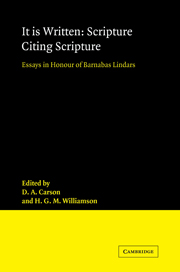4 - Psalms
Published online by Cambridge University Press: 16 January 2010
Summary
The general purpose of this chapter is to discuss the use of the Old Testament in the Psalms, but due to practical limitations our particular task will be confined to a brief survey of the psalmists' use of three more or less related types of material, namely, Israel's historical traditions, creation stories and oracular material. We shall not concern ourselves with oracles or divine promises in general (see Mowinckel, 1962, pp. 62–3), but only with the re-use of older prophetical material, such as in Psalms 89 and 132, in particular. The re-application of existing material is very obvious in Pss. 60: 6–8 (MT 8–10) and 108: 7–9 (MT 8–10), although in this case it is difficult to define the actual source of the common oracle.
Although the Israelites may have been aware of some difference between their historical narratives and creation accounts, yet both themes are found, at times, side by side in the Psalter as if on the same level of reality, as in Psalm 136. Haglund (1984, p. 8) has remarked that ‘in Genesis there is no strict differentiation between primal and other history… In spite of this there is a difference between what is told about the time before Terah and Abraham and about what took place later’; consequently, he excludes motifs found in Genesis 1–11 from his analysis. However, it seems that this collocation of historical themes and primal history is hardly accidental and that in the OT setting, especially in the Psalter, both themes are inseparably related and essentially understood as illustrations or instances of the mighty works of Yahweh.
- Type
- Chapter
- Information
- It Is Written: Scripture Citing ScriptureEssays in Honour of Barnabas Lindars, SSF, pp. 56 - 66Publisher: Cambridge University PressPrint publication year: 1988
- 1
- Cited by



